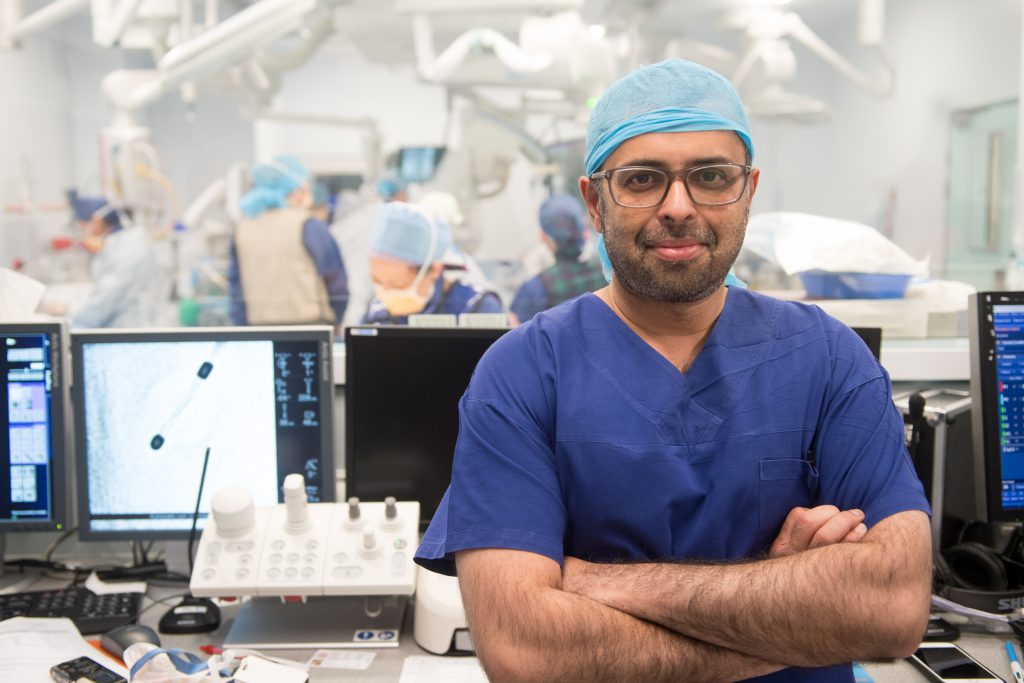
Research shows 1 in 7 patients hospitalised from COVID-19 have suffered heart injury.
Patients with COVID-19 are at risk of developing atrial fibrillation or an abnormal heart rhythm which can lead to stroke. Early studies of the Delta variant is showing an increase in cardiac complications, including a rise in the number of younger patients experiencing significant cardiac events, such as myocarditis.
Professor Ravi Bhindi, Head of the Cardiology Department at Royal North Shore Hospital, Board Director for Heart Research Australia and leading clinician researcher in the treatment of chronic cardiovascular disease, is leading the largest study of its type in Australia, investigating the impact of COVID-19 and trends emerging around cardiac complications.
Before the Delta strain reached Australia, Professor Bhindi’s recent study found that:
- 1 in 7 hospitalised COVID patients had signs of heart injury (elevated levels of heart enzymes),
- 1 in 25 developed atrial fibrillation and abnormal heart rhythms which can lead to stroke
- 1 in 50 had heart failure and
- 1 in 100 suffered heart inflammation.
The patients experiencing atrial fibrillation and abnormal heart rhythms were initially showed to more frequently be over 65 years old (1 in 16 patients) with younger patients less likely to experience these symptoms from the original COVID-19 variant.
With 1 in 7 hospitalised patients experiencing elevated levels of heart enzymes, further investigation is required to determine why this is occurring and what the long-term implications of this are for those affected individuals.
Professor Bhindi states “the initial results of the AUS-COVID study demonstrates that cardiac complications from COVID-19, while concerning, are not as common as we initially feared they would be.”
“The rates of complications were reassuringly lower than those published in other countries across Europe and North America,” he has claimed.

As the Delta strain of COVID-19 continues to run havoc across Australia, the AUS-COVID study is now collecting data on the cardiac complications of this highly contagious strain.
Professor Bhindi states “we are seeing initial reports of an increase in cardiac complications, including a rise in the number of younger patients experiencing significant cardiac events, such as myocarditis.”
He claims “these preliminary indications point to a concerning new trend for a group which has until now, largely escaped significant health complications from COVID-19.”
It is important to note that 14% of the hospitalised patients included in the study sadly died following their admission. Heart Research Australia joins medical professionals around the world and the Australian government to highlight the need for widespread vaccination coverage to protect against this severe disease.
The rapidly increasing number of COVID cases shows how important research such as Professor Bhindi’s work is to help inform clinicians around the likely outcomes and best models of care for these patients.
Professor Bhindi’s AUS-COVID study is the largest registry of cardiac complications from COVID in Australia. It will have a key role in improving health outcomes and potentially saving lives. Professor Ravi Bhindi is one of the directors on the board of Heart Research Australia and we are incredibly proud of the contribution he is making to our community in these difficult times.
To read the feature of Professor Bhindi’s research in The Sydney Morning Herald, click here.

